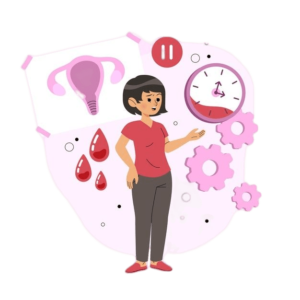Menstrual (Menses)Problem

Menstrual cycles are frequently associated with some unpleasant symptoms preceding your period. Premenstrual syndrome (PMS) includes the most typical symptoms, such as moderate cramps and exhaustion, although the symptoms usually disappear once your period arrives.
Other, more significant menstruation disorders may develop as well. Menstruation that is excessively heavy or excessively light, or the entire lack of a period, may indicate that underlying conditions contribute to an atypical menstrual cycle.
Remember that each woman’s “regular” menstrual cycle implies something different to her. What is normal for you may be abnormal for someone else. It is critical to listen to your body and see your doctor if you detect any substantial changes in your menstrual period.
There are various types of menstruation difficulties that you may encounter.
It is critical to consult with a healthcare practitioner if symptoms cause concern. The following are some reasons to consult a doctor regarding your period:
- Abnormal uterine bleeding
- Postmenopausal bleeding
- Failure to have a period by the age of 15 or within three years of breast development
- No menstrual flow for more than 90 days
- Erratic menstrual bleeding
- Menstrual bleeding that lasts more than seven days and occurs more frequently than every 21 days
- Heavy vaginal bleeding necessitating tampon or pad replacement every 1 to 2 hours
- Signs of toxic shock syndrome, a bacterial infection more typically associated with tampon usage, include severe menstrual discomfort.
